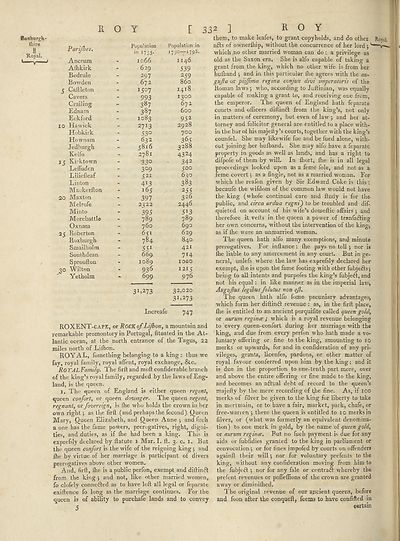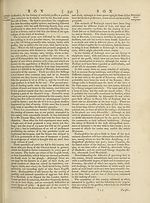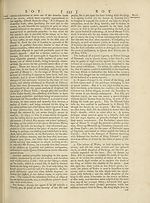Encyclopaedia Britannica, or, a Dictionary of arts, sciences, and miscellaneous literature : enlarged and improved. Illustrated with nearly six hundred engravings > Volume 18, RHI-SCR
(348) Page 332
Download files
Complete book:
Individual page:
Thumbnail gallery: Grid view | List view

ROY
10
J5
20
25
.3°
Pari/hes.
Ancrura
AQikirk
Bedrule
Bowden
Caftleton
Cavers
Crailing
Ednam
Eekford
Hawick
Hobkirk
Hownam
Jedburgh
Kelfo
Krktown
J^effuden
Liiiefleaf
Linton
Mackerfton
Maxton
Melrofe
Minto
Morebattle
Oxnara
Roberton
Roxburgh
Stnailholrn
Southdean
Sproufton
Wilton
Yetholm
Population
in 11S5-
1066
629
297
672
15°1
993
387
387
1083
53°
622
5816
2781
33°
3^9
521
4I3
16s
397
2322
395
789
760
651
784
551
669.
1089
936
699
31!273
[
Population in
1790—179S.
J 146
539
259
860
1418
1200
672
600
952
2928
700
365
3288
4324
342
500
630
383
255
326
2446
5J3
789
690
629
840
421
7*4
io©o
1215
976
32,020
31’273
Increafe
747
ROXENT-CAPE, or o/*Lijbon, a mountain and
remarkable promontory in Portugal, fituated in the At¬
lantic ocean, at the north entrance of the Tagus, 22
miles north of Lifbon.
ROYAL, fomething belonging to a king : thus we
fay, royal family, royal affent, royal exchange, &c..
ROTAL Family. The firft and moft confiderable branch
of the king’s royal family, regarded by the laws of Eng¬
land, is the queen.
The queen of England is either queen regent^
queen confort, or queen dowager. The queen regent^
regnant, or fovereign, is (he who holds the crown in her
own right •, as the firft (and perhaps the fecond) Queen
Mary, Queen Elizabeth, and Queen Anne ; and fuch
a one has the fame powers, prerogatives, right, digni¬
ties, and duties, as if ftie had been a king. This is
exprefsly declared by ftatute 1 Mar. I. ft. 3. c. I.. But
the queen confort is the wife of the reigning king j and
fhe by virtue of her marriage is participant of divers
prerogatives above other women.
And, firft, fhe is a public perfon, exempt and diftinft
from the king j and not, like other married women,
fo clofely connefted as to have loft all legal or feparate
exiftence fo long as the marriage continues. For the
queen is of ability to purchafe lands and to convey
5
332 ] ROY
them, to make leafes, to grant copyholds, and do other
a<fts of ownerftiip, without the concurrence of her lord •, ^
which no other married woman can do ^ a privilege as
old as the Saxon era. She is alfo capable of taking a
grant from the king, which no other wife is from her
hufband ; and in this particular {he agrees with the
gufa or piiffima regin a conjux divi wiper at or is of tha
Roman laws; who, according to Juftinian, was equally
capable of making a grant to, and receiving one from,
the emperor. The queen of England hath feparate
courts and officers diftimft from the king’s, not only
in matters of ceremony, but even of law ■, and her at¬
torney and folicitor general are entitled to a place wdth-
in the bar ot his majefty’s courts, together with the king’s
counfel. She may likewife fue and be fued alone, with¬
out joining her hufband. She may alfo have a feparate
property in goods as well as lands, and has a right to
difpofe of them by will. In ftiort, fhe is in all legal
proceedings looked upon as a feme foie, and not as a
feme covert: as a fingle, not as a married woman. For
which the reafon given by Sir Edward Coke is this :
becaufe the wifdom of the common law would not have
the king (whofe continual care and ftudy is for the-
public, and circa urdua regni) to be troubled and dif-
quieted on account of his wife’s domeftic affairs ; and
therefore it veils in the queen a power of tranfa&ing
her own concerns, without the intervention of the king,
as if fhe were an unmarried rvoman.
The queen hath alfo many exemptions, and minute
prerogatives. For inftance: fhe pays no toll j nor is
fhe liable to any amercement in any court. But in ge¬
neral, unlefs where the law has exprefsly declared her
exempt, fhe is upon the fame footing with other fubje&s;
being to all intents and purpofes the king’s fubjeft, and
not his equal : in like manner as in the imperial law,
Augitjhts legibus folutus non ejl.
The queen hath alfo fome pecuniary advantage^
which form her diftimft revenue : as, in the firft place,
fire is entitled to an ancient perquifite called queen gold,
or aurum regince ; which is a royal revenue belonging
to every queen-confort during her marriage with the
king, and due from every perfon who hath made a vo¬
luntary offering or fine to the king, amounting to 10
merks or upwards, for and in confideration of any pri¬
vileges, grants, licenfes, pardons, or other matter of
royal favour conferred upon him by the king: and it
is due in the proportion to one-tenth part more, over
and above the entire offering or fine made to the king,
and becomes an a£tual debt of record to the queen’s
majefty by the mere recording of the fine. As, if 100
merks of filver be given to the king for liberty to take
in mortmain, or to have a fair, market, park, chafe, or
free-wari en •, there the queen is entitled to 10 merks in
filver, or (what was formerly an equivalent denomina¬
tion) to one merk in gold, by the name of queen gold,
or aurum regince. Put no fuch payment is due for any
aids or fubfidies granted to the king in parliament or
convocation; or for fines impofed by courts on offenders
againft their will *, nor for voluntary prefents to the
king, without any confideration moving from him to
the fubjedl •, nor for any fale or centradi whereby the
prefent revenues or poffeffions of the crown are granted
away or diminifhed.
The original revenue of our ancient queens, before
and foon after the conqueft, feems to have confifted in
certain
10
J5
20
25
.3°
Pari/hes.
Ancrura
AQikirk
Bedrule
Bowden
Caftleton
Cavers
Crailing
Ednam
Eekford
Hawick
Hobkirk
Hownam
Jedburgh
Kelfo
Krktown
J^effuden
Liiiefleaf
Linton
Mackerfton
Maxton
Melrofe
Minto
Morebattle
Oxnara
Roberton
Roxburgh
Stnailholrn
Southdean
Sproufton
Wilton
Yetholm
Population
in 11S5-
1066
629
297
672
15°1
993
387
387
1083
53°
622
5816
2781
33°
3^9
521
4I3
16s
397
2322
395
789
760
651
784
551
669.
1089
936
699
31!273
[
Population in
1790—179S.
J 146
539
259
860
1418
1200
672
600
952
2928
700
365
3288
4324
342
500
630
383
255
326
2446
5J3
789
690
629
840
421
7*4
io©o
1215
976
32,020
31’273
Increafe
747
ROXENT-CAPE, or o/*Lijbon, a mountain and
remarkable promontory in Portugal, fituated in the At¬
lantic ocean, at the north entrance of the Tagus, 22
miles north of Lifbon.
ROYAL, fomething belonging to a king : thus we
fay, royal family, royal affent, royal exchange, &c..
ROTAL Family. The firft and moft confiderable branch
of the king’s royal family, regarded by the laws of Eng¬
land, is the queen.
The queen of England is either queen regent^
queen confort, or queen dowager. The queen regent^
regnant, or fovereign, is (he who holds the crown in her
own right •, as the firft (and perhaps the fecond) Queen
Mary, Queen Elizabeth, and Queen Anne ; and fuch
a one has the fame powers, prerogatives, right, digni¬
ties, and duties, as if ftie had been a king. This is
exprefsly declared by ftatute 1 Mar. I. ft. 3. c. I.. But
the queen confort is the wife of the reigning king j and
fhe by virtue of her marriage is participant of divers
prerogatives above other women.
And, firft, fhe is a public perfon, exempt and diftinft
from the king j and not, like other married women,
fo clofely connefted as to have loft all legal or feparate
exiftence fo long as the marriage continues. For the
queen is of ability to purchafe lands and to convey
5
332 ] ROY
them, to make leafes, to grant copyholds, and do other
a<fts of ownerftiip, without the concurrence of her lord •, ^
which no other married woman can do ^ a privilege as
old as the Saxon era. She is alfo capable of taking a
grant from the king, which no other wife is from her
hufband ; and in this particular {he agrees with the
gufa or piiffima regin a conjux divi wiper at or is of tha
Roman laws; who, according to Juftinian, was equally
capable of making a grant to, and receiving one from,
the emperor. The queen of England hath feparate
courts and officers diftimft from the king’s, not only
in matters of ceremony, but even of law ■, and her at¬
torney and folicitor general are entitled to a place wdth-
in the bar ot his majefty’s courts, together with the king’s
counfel. She may likewife fue and be fued alone, with¬
out joining her hufband. She may alfo have a feparate
property in goods as well as lands, and has a right to
difpofe of them by will. In ftiort, fhe is in all legal
proceedings looked upon as a feme foie, and not as a
feme covert: as a fingle, not as a married woman. For
which the reafon given by Sir Edward Coke is this :
becaufe the wifdom of the common law would not have
the king (whofe continual care and ftudy is for the-
public, and circa urdua regni) to be troubled and dif-
quieted on account of his wife’s domeftic affairs ; and
therefore it veils in the queen a power of tranfa&ing
her own concerns, without the intervention of the king,
as if fhe were an unmarried rvoman.
The queen hath alfo many exemptions, and minute
prerogatives. For inftance: fhe pays no toll j nor is
fhe liable to any amercement in any court. But in ge¬
neral, unlefs where the law has exprefsly declared her
exempt, fhe is upon the fame footing with other fubje&s;
being to all intents and purpofes the king’s fubjeft, and
not his equal : in like manner as in the imperial law,
Augitjhts legibus folutus non ejl.
The queen hath alfo fome pecuniary advantage^
which form her diftimft revenue : as, in the firft place,
fire is entitled to an ancient perquifite called queen gold,
or aurum regince ; which is a royal revenue belonging
to every queen-confort during her marriage with the
king, and due from every perfon who hath made a vo¬
luntary offering or fine to the king, amounting to 10
merks or upwards, for and in confideration of any pri¬
vileges, grants, licenfes, pardons, or other matter of
royal favour conferred upon him by the king: and it
is due in the proportion to one-tenth part more, over
and above the entire offering or fine made to the king,
and becomes an a£tual debt of record to the queen’s
majefty by the mere recording of the fine. As, if 100
merks of filver be given to the king for liberty to take
in mortmain, or to have a fair, market, park, chafe, or
free-wari en •, there the queen is entitled to 10 merks in
filver, or (what was formerly an equivalent denomina¬
tion) to one merk in gold, by the name of queen gold,
or aurum regince. Put no fuch payment is due for any
aids or fubfidies granted to the king in parliament or
convocation; or for fines impofed by courts on offenders
againft their will *, nor for voluntary prefents to the
king, without any confideration moving from him to
the fubjedl •, nor for any fale or centradi whereby the
prefent revenues or poffeffions of the crown are granted
away or diminifhed.
The original revenue of our ancient queens, before
and foon after the conqueft, feems to have confifted in
certain
Set display mode to:
![]() Universal Viewer |
Universal Viewer | ![]() Mirador |
Large image | Transcription
Mirador |
Large image | Transcription
Images and transcriptions on this page, including medium image downloads, may be used under the Creative Commons Attribution 4.0 International Licence unless otherwise stated. ![]()
| Permanent URL | https://digital.nls.uk/193023231 |
|---|
| Attribution and copyright: |
|
|---|
| Description | Ten editions of 'Encyclopaedia Britannica', issued from 1768-1903, in 231 volumes. Originally issued in 100 weekly parts (3 volumes) between 1768 and 1771 by publishers: Colin Macfarquhar and Andrew Bell (Edinburgh); editor: William Smellie: engraver: Andrew Bell. Expanded editions in the 19th century featured more volumes and contributions from leading experts in their fields. Managed and published in Edinburgh up to the 9th edition (25 volumes, from 1875-1889); the 10th edition (1902-1903) re-issued the 9th edition, with 11 supplementary volumes. |
|---|---|
| Additional NLS resources: |
|

